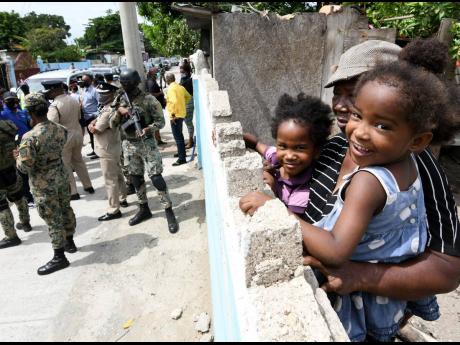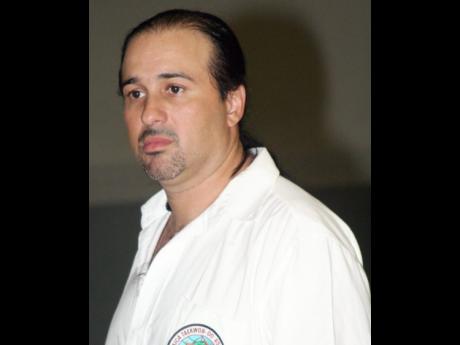‘Take away gangsters’ playgrounds’
Experts weigh efficiency of ZOSO’s social intervention methods; CAPRI reports calls for review of strategies
The spotlight on social-intervention tactics in crime-ravaged neighbourhoods, controlled by gangs with unchecked violence, is glaring. While some critics and security stakeholders support these methods, others remain critical, citing their prolonged history of failures despite being deemed essential by some.
The issue was among those that took centre stage last week as the Caribbean Policy Research Institute’s (CAPRI’s) launched its latest study, dubbed “Groundwork for Peace: Reorienting Zones of Special Operations (ZOSOs) for Sustained Violence Reduction”.
The report evaluates the 2017-launched government initiative, critiquing the “hearts and minds” approach, suggesting that it overlooks violence by organised gangs in informal communities. It also posits that the ZOSOs’ current focus on social development and infrastructure does not adequately address gang strongholds, even as it advocates for land tenure regularisation in areas.
In explaining the rationale for ZOSOs, National Security Minister Dr Horace Chang has noted that this approach is different from previous strategies, where social intervention took place without the removal of criminals. Instead, he outlined the need to ‘clear, hold and build’ communities.
“The clear, hold and build strategy is to remove gangs from the community, leave the police in there, and in the build phase we deal with both the social and infrastructure problems in those communities,” he said in 2021, arguing that this would produce long-term results and provide the best chance of success for community-based organisations.
But many are questioning whether the strategy is working, suggesting a new approach.
The CAPRI study recommends that the Government revise the current ZOSO strategy to a three-pronged approach targeted at formalising informal and semi-formal communities; that it continue localised states of emergency or similar measures to temporarily detain known perpetrators of violent crimes, and that it make social intervention targeting behaviour modification a priority in the face of making land tenure and infrastructure regularisation a primary focus.
“ZOSO’s focus on social development initiatives and cursory infrastructural projects does not directly address the fact that communities function as safe havens for violent gangs. By ignoring that, the strategy fails to effect the transformations that would reduce extreme violence sustainably,” reads a section of the study.
The qualitative study reviewed, among variables, academic literature, analysed crime policies internationally, and also scrutinised a compilation of crime and violence statistics from the Jamaica Constabulary Force over 11 years. It was limited by “the extent of the analysis concerning ZOSOs and land tenure regularisation, and the unavailability of specific data ... details on gangs, such as gang members, sizes and location”.
More than 500 homicides have been reported in Jamaica this year, some of which have taken place in or near ZOSOs. There are currently seven active ZOSOs located in Denham Town in Kingston; Norwood and Mount Salem in St James; Greenwich Town, Parade Gardens and August Town in St Andrew; and Savanna-la-Mar in Westmoreland.
Chang has openly chided Jamaica’s social intervention initiatives, arguing that they have not been effective as crime-fighting measures. For a decade, he argued, some $380 billion has been spent on social intervention nationally with not much to show.
ZOSO spend
Yesterday, the Jamaica Social Investment Fund told The Sunday Gleaner that since 2017, it has spent just under $2.5 billion in five of the ZOSOs on infrastructure such as roads, water, drainage, school rehabilitation, safe passage, and land tenure. The sum also includes improvement works on police stations, parks and green spaces, as well as zinc fence removal and substitution.
The agency said it is still doing planning work in two ZOSOs – Parade Gardens and Savanna-la-Mar.
Criminologist Dr Jason McKay, one of the panellists at the launch, explained that social intervention measures must go hand-in-hand with any long-term security force operation administered in ZOSOs.
“Gangs make up an extremely small number of any community they operate in. They are literally parasites, and the majority of those persons who are in those gangs come from traditional gang families. It is the same tenement yard producing the same gangsters, generation after generation,” McKay explained at the launch.
“Anybody who is brought up in that kind of setting and indoctrination is going to create a gangster. Now, will social intervention change that person? No, it won’t,” he said. “However, in order for gangsters to flourish, they need a playground, and it is the lack of social infrastructure, of a community that is able to be policed, the large abundance of persons who are not in circumstances that allow them to attend school regularly ... that will give the additional numbers that the gang needs and recruits from. That is why we can’t abandon social intervention.”
Failed by society
These additional numbers are important from a policing perspective, as cops not only interact with the hardcore gangsters but also the victims of the gangs’ recruitment efforts – those persons failed by society – McKay said, noting that he is in support of the ZOSOs, which combine social intervention and security force occupation over the long term.
Venesha Phillips, former councillor of the Papine division in St Andrew, said she supported the Government’s discontinuation of former social-intervention strategies.
“Jamaica speaks of social intervention as if it is a singular activity. It is actually a teething process. Crime is a social derivative and violence isn’t, though it can be impacted and supported by crime. Violence comes from various objectives of those who pursue violence, and if economics is at the heart of that, then social intervention will fail,” said Phillips.
“It cannot be that every time we are confronted with crime and violence heightening in society, the rush is for social intervention. I believe that we have to look at the situations as they present themselves ... . It is not a one-size-fits-all approach,” she said. “Many will not want to accept that social intervention in the way that we have applied it has failed. We need to look at other priorities – who are the perpetrators and what motivates them – and then we apply the prescriptive.”
In the meantime, Michael Phipps, a senior superintendent of police, believes that social intervention is extremely important in confronting gangs in Jamaica.
“I believe that the adults, especially in the ZOSOs, have no idea of conflict resolution. [We see this in] their behaviour from very early out because of a lack of exposure and training about behaviour modification; they don’t know there is another way out. They will ask you ‘How are you telling me now that I should forgive a person who killed my father right in front of me?’” he said, emphasising his support of social intervention strategies.



